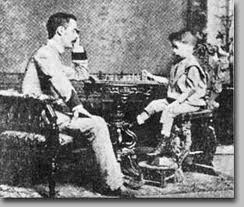
Too Young and Too Smart: Understanding Child Prodigies
Written by Craig Rogers, Posted on , in Section Teens & Tweens
Brandenn Bremmer was ten years old when he began college. He was a normal seeming kid, though obviously brilliant, with an IQ of 160. Think about what you were doing when you were ten. I know what I was doing. I was climbing trees and playing with a slingshot and having contests to see who could throw a rock the farthest. I was just barely getting the confidence up to talk to girls in a way that hinted maybe I kind of sort of liked them in a different and new way. I was going to school and trying my best, but easily distracted. I was having sleepovers and racing my bike downhill. What I was not doing was acing the college entrance exams and beginning higher education.
By 14 years old, I felt much more sophisticated. I was a freshman in high school. The low man on the totem pole again, but I felt like I was in the big leagues. Girls were an all consuming topic in my mind, and the only thing more important than them was football. All in all, I grew up a bit but I was not that different from the me of four years earlier. Brandenn Bremmer, on the other hand, would take his own life, with a single gunshot to the head, at age 14.
Child prodigies often occur in the fields of music, math, chess and other areas that can be quantitatively measured. Art and creative topics do have a high incidence of prodigal type success at an early age, but because the quality of the work is subjective, prodigies in these fields do not usually get the same attention.
Most prodigies are discovered early, maybe by learning to read at around the age of 3, or performing exceptionally at the piano early on, or by tackling complicated logic problems as if by accident. But for many prodigies, the candle is burning at both ends. When parents discover their child's talent and special abilities, they often put the pressure on to maximize the achievement. In this way, parents of prodigies are a kind of funhouse mirror version of parents that are just exceptionally demanding of their 'regular' kids. The idea being that to 'waste' the opportunity presented by a child's intellectual gifts would be negligent on the parents' behalf.
What Can Parents Learn From The Struggles of Child Prodigies?
Parenting in the best of circumstances is tricky. When parents must chart uncertain territory of any kind, the challenges of parenthood are dramatically amplified. Parenting is often done on the knife's edge between success and failure. That is why so many parents feel like they are worse parents than they actually are. It's hard to tell. Sometimes being a parent can feel like mixing a batch of cookies with a blindfold on and waiting until they pop out of the oven to find out how you did.
When it comes to prodigies, the teen years are often the beginning of a very difficult time. The teenage years are a time filled with sweeping transformations. Puberty brings about vast changes to the body and hormones rage as motivations become entangled with good and bad priorities. Friends come and go. Goals get set and either met or forgotten. Ultimately, many child prodigies are so wrapped up in their schoolwork and extracurricular intellectual pursuits that they fail to notice that their childhood has passed them by.
Worse, many child prodigies report that they feel that they peaked at around 15.
Child prodigies are rare. But the lessons that parents can learn from the struggles that prodigal teens must face are universal.
You don't get a second chance at childhood. Parents should help their children develop attainable goals both scholastically and in their personal lives, but they must also help them develop the values and priorities needed to accomplish those goals for the rest of their lives. Childhood is a crucial leg in the marathon of life, but it's important to remember that the things that happen to us early, will affect our outcomes later on.
That means that if an individual finds success that will define them for the rest of their lives at the tender age of 12, they may struggle to live up to their own child-self. Living in your own shadow must be a perplexing and humbling feeling. But that also means that if you develop sustainable values, and the ability to prioritize what is actually important in the quest to achieve your goals, you can use that to develop a lifetime of motivation.
Just like many teens have the sense that as childhood ends, so does the opportunity to have fun, but learn later that fun will continue to define memories for the rest of their lives. So too should parents of child prodigies understand that missing out on a childhood would rob kids of an opportunity to have fun, because they will be able to continue to learn and enrich themselves for their rest of their lives.
If you know or are the parent of a bright teenager whose intellectual gifts are posing challenges in everyday life, professional help may be available. Sometimes guidance and structure outside of the normal routine are able to bring out characterisitics that will help an individual feel more like themselves. If you believe that this kind of treatment would benefit a teen you know, Cedar Ridge Academy may be the next stop on the way to your child's future success.
